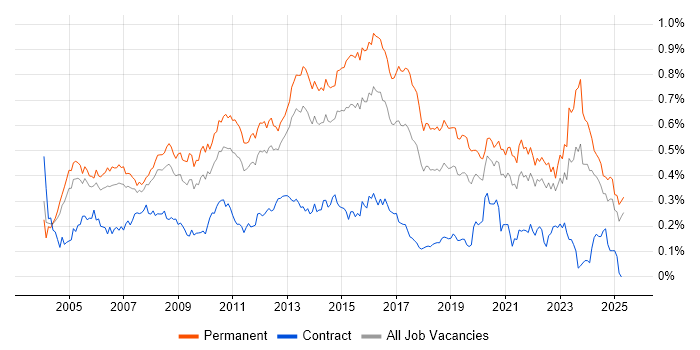Application Support Analyst
England > South East
The median Application Support Analyst salary in the South East is £34,828 per year, according to job vacancies posted during the 6 months leading to 27 February 2026.
The table below compares current salary benchmarking and summary statistics with the previous two years.
| 6 months to 27 Feb 2026 |
Same period 2025 | Same period 2024 | |
|---|---|---|---|
| Rank | 207 | 240 | 253 |
| Rank change year-on-year | +33 | +13 | +112 |
| Permanent jobs requiring an Applications Support Analyst | 69 | 33 | 90 |
| As % of all permanent jobs in the South East | 0.59% | 0.43% | 0.72% |
| As % of the Job Titles category | 0.64% | 0.49% | 0.76% |
| Number of salaries quoted | 55 | 25 | 61 |
| 10th Percentile | £27,750 | £30,500 | £25,000 |
| 25th Percentile | £33,000 | £31,250 | £28,500 |
| Median annual salary (50th Percentile) | £34,828 | £36,500 | £42,500 |
| Median % change year-on-year | -4.58% | -14.12% | +6.25% |
| 75th Percentile | £38,750 | £60,000 | £51,250 |
| 90th Percentile | £60,000 | - | £56,250 |
| England median annual salary | £39,305 | £50,000 | £45,000 |
| % change year-on-year | -21.39% | +11.11% | +3.45% |
All Permanent IT Job Roles
South East
For comparison with the information above, the following table provides summary statistics for all permanent IT job vacancies in the South East. Most job vacancies include a discernible job title that can be normalized. As such, the figures in the second row provide an indication of the number of permanent jobs in our overall sample.
| Permanent vacancies in the South East with a recognized job title | 10,807 | 6,778 | 11,782 |
| % of permanent jobs with a recognized job title | 93.07% | 87.65% | 93.90% |
| Number of salaries quoted | 7,025 | 3,641 | 8,990 |
| 10th Percentile | £28,500 | £31,250 | £27,500 |
| 25th Percentile | £35,000 | £42,500 | £36,250 |
| Median annual salary (50th Percentile) | £50,000 | £55,790 | £50,000 |
| Median % change year-on-year | -10.38% | +11.58% | -9.09% |
| 75th Percentile | £65,000 | £72,500 | £65,000 |
| 90th Percentile | £82,500 | £85,000 | £77,500 |
| England median annual salary | £55,000 | £60,000 | £55,000 |
| % change year-on-year | -8.33% | +9.09% | -10.57% |
Applications Support Analyst
Job Vacancy Trend in the South East
Historical trend showing the proportion of permanent IT job postings featuring 'Applications Support Analyst' in the job title relative to all permanent IT jobs advertised in the South East.

Applications Support Analyst
Salary Trend in the South East
Salary distribution trend for Applications Support Analyst job vacancies in the South East.

Applications Support Analyst
Salary Histogram in the South East
Salary distribution for jobs citing Applications Support Analyst in the South East over the 6 months to 27 February 2026.
Applications Support Analyst
Job Locations in the South East
The table below looks at the demand and provides a guide to the median salaries quoted in IT jobs citing Applications Support Analyst within the South East region over the 6 months to 27 February 2026. The 'Rank Change' column provides an indication of the change in demand within each location based on the same 6 month period last year.
| Location | Rank Change on Same Period Last Year |
Matching Permanent IT Job Ads |
Median Salary Past 6 Months |
Median Salary % Change on Same Period Last Year |
Live Jobs |
|---|---|---|---|---|---|
| Thames Valley | +27 | 38 | £35,000 | +7.69% | 4 |
| Buckinghamshire | +23 | 28 | £35,000 | +7.69% | 4 |
| Hampshire | +13 | 18 | £33,500 | -34.63% | 2 |
| Berkshire | 0 | 8 | £56,250 | +69.81% | |
| Kent | -23 | 8 | £34,828 | -41.95% | |
| Surrey | -11 | 5 | - | - | 1 |
| Oxfordshire | +10 | 2 | - | - | |
| Applications Support Analyst England |
|||||
Applications Support Analyst Skill Set
Top 30 Co-Occurring Skills & Capabilities in the South East
For the 6 months to 27 February 2026, Applications Support Analyst job roles required the following skills and capabilities in order of popularity. The figures indicate the absolute number of co-occurrences and as a proportion of all permanent job ads across the South East region featuring Applications Support Analyst in the job title.
|
|
Applications Support Analyst Skill Set
Co-Occurring Skills & Capabilities in the South East by Category
The following tables expand on the one above by listing co-occurrences grouped by category. They cover the same employment type, locality and period, with up to 20 co-occurrences shown in each category:
